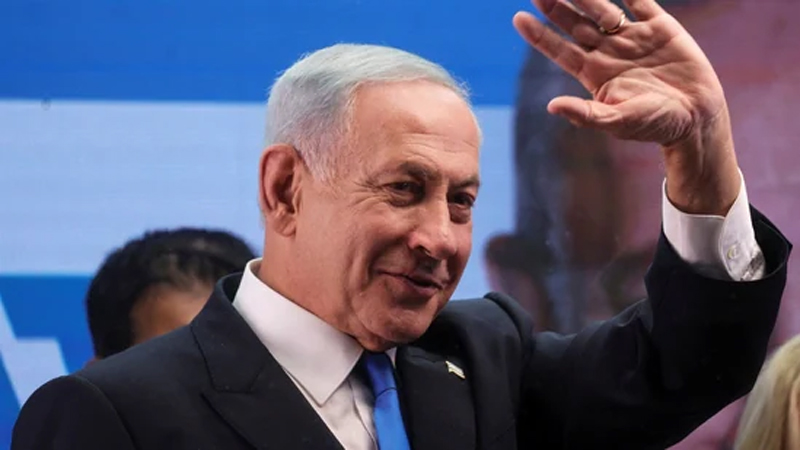JERUSALEM: Israel’s former prime minister Benjamin Netanyahu was poised for a resounding victory on Wednesday as his coalition of right-wing religious parties was set to win a comfortable majority in the fifth election in four years, an outcome that is likely to end the political impasse that had paralysed the country.
With some 86 per cent of the votes counted, the bloc led by 73-year-old Netanyahu was seen to be winning 65 seats, a comfortable majority in the 120-member Knesset or Parliament, but these numbers could change a little after the so-called double envelope votes are counted.
The Left wing Meretz party, which is hovering around the threshold mark but is still under it, has traditionally done well in these ballots and if it succeeds to cross the line then the Netanyahu bloc could get limited to 61-62 mark.
The so-called double-envelope ballots cast by members of security forces, prisoners, people with disabilities, diplomats serving abroad, and some others remain to be counted, election commission sources said.
The predominantly Arab party, Balad, is also close to the threshold mark but most of the analysts are giving it “almost no chance” of making it into the Knesset.
The exit polls projected pro-Netanyahu parties may win up to 65 seats in the 120-member Parliament. The alliance comprised Netanyahu’s Likud party, far right religious Zionism/Jewish Power, ultra-Orthodox parties Shas and United Torah Judaism.
The outcome would mark a stunning comeback for Netanyahu, who is currently on trial in three corruption cases, after a short stint in opposition.
Israelis voted on Tuesday for an unprecedented fifth time in four years to break the political impasse that has paralysed the country.
Netanyahu’s Likud party is leading with 32 mandates. Yesh Atid remains at 24 mandates, Religious Zionist Party at 14, and the National Unity Party at 12. Shas dropped down to 11 mandates, and United Torah Judaism is at 8 mandates.
Yisrael Beytenu, the Islamist Ra’am party and Hadash-Ta’al remained at five mandates, and Labour at four.
The left-wing Meretz party has not crossed the electoral threshold of 3.25 per cent.
The ongoing count is not representative of the overall vote since ballots come in from different areas of the country at different times, and the percentages allotted to each party will likely shift as the tally continues.
Israel has been locked in an unprecedented period of political stalemate since 2019, when Netanyahu, the country’s longest-serving leader was charged with bribery, fraud and breach of trust.
About 6.78 million Israeli citizens were eligible to elect their 25th Knesset. Some 210,720 new voters were able to vote for the first time, accounting for about four to five seats, adding an interesting dimension to the polls.
For many years, Netanyahu – one of the most polarising ones – appeared to be politically invincible, the “Mr. Security” who met with a rude jolt after being ousted by an unprecedented coalition of parties whose only common goal was to see him out.
In his previous tenures, he took a hard line towards the Palestinians, putting security concerns at the top of any talk of peace, and long warned of existential danger to Israel from Iran. However, he has been recently dogged by trials for alleged corruption. He has consistently denied any wrongdoing.
Netanyahu’s likely victory could see an upward trajectory in Indo-Israel ties.
An advocate of strong bilateral ties with India, Netanyahu was the second Israeli Prime Minister to visit India in January 2018. Prime Minister Narendra Modi made his historic visit to Israel, the first by an Indian Prime Minister, in July 2017 when the ‘chemistry’ between the two leaders became the subject of intense discussion.
India and Israel elevated their bilateral relations to a strategic partnership during Modi’s visit to Israel. Since then, the relationship between the two countries has focused on expanding knowledge-based partnership, which includes collaboration in innovation and research, including boosting the ‘Make in India’ initiative.
India’s relations with Israel have remained steady and strong even with the incumbent leadership, showing distinct signs of further progress with I2U2 (India, Israel, the United States and the United Arab Emirates) and discussions around a Free Trade Agreement, but it has not matched the heightened hype so visible with Netanyahu in power.
Born in Tel Aviv in 1949, Netanyahu holds the record of being the longest-serving Prime Minister in the country’s history. Having served in the position earlier between 1996 and 1999, Netanyahu in 2020 surpassed the record held by one of the Jewish state’s founding leaders, David Ben-Gurion. (PTI)


